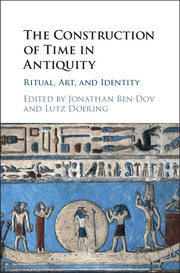Book contents
- The Construction of Time in Antiquity
- Frontispiece
- The Construction of Time in Antiquity
- Copyright page
- Contents
- Illustrations
- Contributors
- Acknowledgments
- 1 Introduction
- 2 Time and Natural Law in Jewish-Hellenistic Writings
- 3 Calendars, Politics, and Power Relations in the Roman Empire
- 4 Doubling Religion in the Augustan Age: Shaping Time for an Empire
- 5 Real and Constructed Time in Babylonian Astral Medicine
- 6 The Intellectual Background of the Antikythera Mechanism
- 7 Divine Figurations of Time in Ancient Egypt
- 8 The Moon and the Power of Time Reckoning in Ancient Mesopotamia
- 9 Toward a Phenomenology of Time in Ancient Greek Art
- 10 Women’s Bodies as Metaphors for Time in Biblical, Second Temple, and Rabbinic Literature
- 11 The Beginning of Sabbath and Festivals in Ancient Jewish Sources
- 12 Seasoning the Bible and Biblifying Time through Fixed Liturgical Reading Systems (Lectionaries)
- 13 The Roman Ember Days of September and the Jewish New Year
- 14 Celebrations and the Abstention from Celebrations of Sacred Time in Early Christianity
- Author Index
- Subject Index
- References
1 - Introduction
Published online by Cambridge University Press: 06 October 2017
- The Construction of Time in Antiquity
- Frontispiece
- The Construction of Time in Antiquity
- Copyright page
- Contents
- Illustrations
- Contributors
- Acknowledgments
- 1 Introduction
- 2 Time and Natural Law in Jewish-Hellenistic Writings
- 3 Calendars, Politics, and Power Relations in the Roman Empire
- 4 Doubling Religion in the Augustan Age: Shaping Time for an Empire
- 5 Real and Constructed Time in Babylonian Astral Medicine
- 6 The Intellectual Background of the Antikythera Mechanism
- 7 Divine Figurations of Time in Ancient Egypt
- 8 The Moon and the Power of Time Reckoning in Ancient Mesopotamia
- 9 Toward a Phenomenology of Time in Ancient Greek Art
- 10 Women’s Bodies as Metaphors for Time in Biblical, Second Temple, and Rabbinic Literature
- 11 The Beginning of Sabbath and Festivals in Ancient Jewish Sources
- 12 Seasoning the Bible and Biblifying Time through Fixed Liturgical Reading Systems (Lectionaries)
- 13 The Roman Ember Days of September and the Jewish New Year
- 14 Celebrations and the Abstention from Celebrations of Sacred Time in Early Christianity
- Author Index
- Subject Index
- References
- Type
- Chapter
- Information
- The Construction of Time in AntiquityRitual, Art, and Identity, pp. 1 - 8Publisher: Cambridge University PressPrint publication year: 2017



